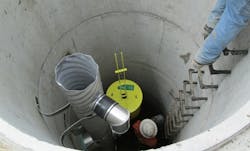Northwest Washington Communities Reduce Storm Water Detention Volume
Located in northwest Washington, Snohomish County is home to a number of new residential communities. To save on building expenses, as well as valuable lot space, developers have chosen Thirsty Duck floating outlets and skimmers to reduce the size of each development’s stormwater vault detention system.
Stratford Court and Glennwick Grove are two residential communities owned by Phoenix Development of Lynnwood, Wash. Both developments were able to reduce the size of their stormwater vault detention systems by more than 10,000 cu ft, allowing for more space and reduced construction costs.
Stratford Court, a 35-unit, single-family home development in Bothell, Wash., sits on a 7.4-acre site. Glennwick Grove, located in Lynnwood, Wash., is home to 41 residential lots on 13.1 acres of land.
To minimize the space necessary for each detention facility and to reduce construction costs, the engineers turned to Thirsty Duck for a solution.
Using the TD-244, the team was able to significantly reduce the underground stormwater detention volume, saving time and money.
The TD Series product line features expanding bellows operation and is designed for high flux, low flow applications. The body of the TD floats while maintaining a connection to the outfall through the welded polyurethane bellows.
Water enters from below the body, providing skimming. The bellows allow the body to rise to the peak design stage and return to the rest position when the water level drops below the minimum discharge elevation. By setting the orifice below the water surface elevation a fixed distance, the Thirsty Duck floating outlet and skimmer achieves the maximum allowable discharge rate at much lower stage elevations, maximizing the outflow rate and minimizing the required detention volume.
Stratford Court’s Thirsty Duck system was installed in July 2013, reducing detention system volume by 16%, or 12,000 cu ft. When the Glennwick Grove Thirsty Duck system was installed in September 2013, volume was reduced by 26%, or 10,500 cu ft.
“The Thirsty Duck support staff and engineers were very helpful in providing alternatives for each individual project,” said Dené Kuzaro, engineer for The Blueline Group and the designer on the two projects. “We will be evaluating the feasibility of Thirsty Duck on many future projects to save space and reduce cost of the detention facility.”
Wynbrook II, located in Brier, Wash., and owned by Reliant Homes of Everett, Wash., is another Snohomish County development. Engineering of the 23-lot subdivision began in spring 2013 and construction began in August of the same year. Early in the design phase, the team encountered a major obstacle.
“We first designed a concrete detention vault without the Thirsty Duck system and it would not fit in the allotted area; it was too big,” said Brian R. Kalab, P.E., president of Insight Engineering Co. Inc. “We would have had to lose a lot in our subdivision if the Thirsty Duck system was not available.”
After weighing other detention options, it was determined the Thirsty Duck system could reduce the detention volume by 17%.
[Visit Thirsty Duck's SWS Storefront]
Because the product was new to the area, Thirsty Duck representatives were on hand to provide assistance every step of the way, from design through construction. Engineers also received the initial flow rate calculations from the company and used them during the approval process that was necessary before the system could be installed.
The TD244-96 was installed in October 2013 and was able to reduce Wynbrook’s stormwater vault detention system by 16,800 cu ft.
